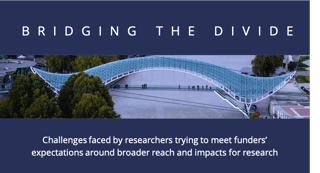
Results of a survey of over 10,000 researchers' motivations, responsibilities, target audiences, channels and metrics relating to broader impacts.
Kudos, the award-winning service for accelerating research impact, has announced headline results from a recent study of researchers’ efforts to achieve broader impacts of their research. The "Bridging the Divide" project gathered input from researchers, university administrators, funders and others with a role or interest in ensuring that research engages and benefits audiences beyond academia. It was led by Kudos, and sponsored by The International Center for the Study of Research, the American Chemical Society, American Society for Microbiology, Brill Publishers, Karger Publishers and Royal Society of Chemistry.
The study combined desk research and teleinterviews with a survey of over 10,000 researchers, exploring motivations, responsibilities, target audiences, channels and metrics relating to broader impacts. Key findings include:
- The majority (95.3% of respondents) want to achieve broader impacts with their work
- The most frequently cited motivations for wanting to achieve broader impacts were a desire to solve real-world problems (65.8%); to make a difference to others (61.9%); and to improve perceptions of the value of research (53.4%)
- Approximately half of respondents (50.9%) considered themselves to have primary responsibility for achieving broader impacts, but their continued reliance on academic channels (e.g. scholarly publications, used by 76.3% in this context, and conferences, used by 73.0%) suggest a lack of understanding either of what broader impacts are, or how they are best achieved
- Almost three quarters of respondents (73.7%) agreed that the growing focus on broader impacts has resulted in more collaboration between the academic and non-academic sectors, with 77.0% saying this is expected or encouraged by their employer and yet 46.9% said they are not given enough support in this area
- Only 41.3% of respondents considered that the metrics, indicators or narratives used by their employer to evaluate their broader impacts are fit for purpose, with 26.9% considered that current metrics actively discourage collaboration with researchers in non-academic sectors.
“Although researchers recognize the value of broader impacts, on a practical level they are constrained from taking the necessary steps to achieve them,” commented Melinda Kenneway, CEO of Kudos. “There is a knowledge and skills gap at the individual level, and a lack of resource at the institutional level for understanding and exploiting the full impact potential of individual research projects. This study has identified several opportunities for new services and initiatives that would enable not only institutions, but also publishers, societies and other related organizations, to better support the development of broader impacts.”
More information, and a free summary of the research, is available here.
— ENDS —
Contact:
Charlie Rapple
charlie.a.rapple@growkudos.com
+44 1865 872527
About Kudos
Over 350,000 researchers have signed up to use Kudos’ services for accelerating and broadening research impact. The company’s toolkits help to showcase research to broader audiences, and provides researchers, research organizations and publishers with guidance and insight around the channels and activities that are most effective for reaching and engaging target audiences. To find out more about Kudos, visit www.growkudos.com



